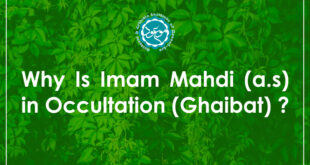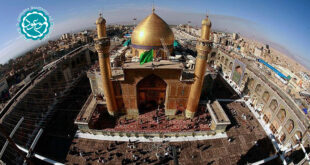Importance of praying for hastening of Imam Zamana’s (a.t.f.s.) reappearance
For the one whose sole objective in life is awaiting for the reappearance of Imam al-Asr (a.t.f.s.), salvation with the reappearance of Imam (a.t.f.s.) is his most ardent desire in life. Then the actions that make him most sad and grievous are the difficulties and discomforts caused to Imam (a.t.f.s.) during the period of occultation. Therefore he considers it as his duty to find a solution for the removal of Imam’s (a. t. f. s) sorrows, difficulties and calamities. To achieve this aim he is not negligent in doing whatever he is called upon to do.
By paying attention to the point highlighted above we can understand that the best and the most important relief (faraj) for Imam al- Asr (a.t.f.s.) is nothing but the permission for his reappearance from Allah, which apart from being his own salvation is also the salvation of Allah’s Prophets (a.s.) and His friends (awliyya) (a.s.). And the most effective medium for achieving this aim is supplication for the hastening of Imam’s (a.t.f.s.) reappearance, which is among the necessary conditions and one of the most evident indications of his recognition in the time of occultation, without which all claims of recognition and Mastership of Imam (a.t.f.s.) will sound hollow.
This excellent practice (of dua) is highlighted by Imam (a.t.f.s.) himself at the time of his birth. Hakima Khatoon (a.r.), the respected paternal aunt of Imam Hasan al-Askari (a.s.) saw that immediately after coming to this world, Imam (a.t.f.s.) put his head down in prostration and raised his index finger towards the sky and recited thus:
‘I give witness that there is no God except Allah, He is One and has no partner and I bear witness that my great grandfather (s.a.w.s.) is the Messenger of Allah and my father is Ameerul Mo’mineen (a.s.). Then he recited the names of all other Imams (a.s.) till he came to his own name. Then he prayed to Allah thus:
‘O Allah! Implement that which You have promised me and complete my affair and make my step steadfast and fill the earth with justice and equity through me.’1
And the practice of beseeching Allah for the hastening of Imam’s (a.t.f.s.) reappearance (faraj), is evident even in the lives of the earlier Imams (a.s.). From the traditions of Imam Sadiq (a.s.), we see that in the morning of the 21st of the month of Ramazan, after praying the Namaz al-Subh, he used to go in prostration, and then recite a particular dua, at the end of which he used to plead loudly to Allah:
‘O Allah! By the greatness of Your Majesty, I ask from You by the right of all that I asked You and also by whatever I did not ask, which had I known I would certainly have asked, that send blessings on Mohammed (s.a.w.s.) and his progeny and give permission for the salvation of the one with whose salvation is the salvation of all your friends and chosen ones from Your creation. Then remove the oppressors through him and destroy them. O Lord of the universe! Hasten this matter!’
The narrator (of this tradition) says: After Imam (a.s.) raised his head from prostration, I asked: May I be sacrificed upon you, I heard you praying thus: Are you not that one? He (a.s.) informed:
‘No, he is Qaim al-Ale Muhammad (s.a.w.s.).’
Then Imam (a.s.) recommended:
‘Anticipate the affair (reappearance) of your master day and night. This is because Allah manifests an affair every day and the manifestation of one affair does not prevent Him from manifesting other affairs. This is Allah, Lord of the universe.’2
The last sentence is a pointer towards the fact that the time of reappearance of Imam (a.t.f.s.) is subject to change (بِداء).
An interesting point in this tradition is the question asked by the narrator to Imam (a.s.). It serves to remind us that supplication for hastening the salvation of Imam al-Asr (a.t.f. s.) is in fact a supplication for the salvation of all the chosen ones of Allah, from the best of the creation – Holy Prophet (s.a.w.s.) till his (s.a.w.s.) successors and the angels of Allah, as all of them are awaiting the reappearance of Imam (a.t.f.s.). In Dua al-Ahad, we ask from Allah:
‘O Allah! Make your Prophet Mohammed (s.a.w.s.) rejoice and those who follow his call by the sight of Imam al-Asr (a.t.f.s.).’3
But the most important benefit of praying for the reappearance of Imam al-Asr (a.t.f.s.) is that if the believer truly acknowledges his Imamat and testifies in his Mastership, his faith is protected in the period of occultation, and his religion is safeguarded from destruction. This is the glad tiding that Imam Hasan Askari (a.s.) gave to Ahmed b. Ishaaq:
‘O Ahmed b. Ishaaq! His example in the nation is like the example of Khizr and Zulqarnain. I swear by Allah, occultation will be there (for him) in which (period) no one will be saved from destruction, except the one whom Allah keeps steadfast on belief of his Imamat and to whom Allah gives taufiq during the period of occultation to pray for the hastening of his appearance.’
Next day when Ahmed b. Ishaaq went again to see Imam Hasan Askari (a.s.), he asked: ‘What is the sunnat of Khizr and Zulqarnain, which will be continued in him (Qaim)?’
Imam replied:
‘Yes, I swear by my Lord! He will be in occultation, until most of those who believe in him will turn away (from faith). None will remain steadfast except the one from whom Allah has taken the covenant of our Mastership and upon whose heart Allah has established faith and strengthened him with the angel Ruhul Quds from His side.’4
It must be pointed out that in this tradition, supplication for hastening the reappearance of Imam al-Asr (a.t.f.s.) in the period of occultation has been put at par along with the belief in his Imamat which is the root and axis of one’s faith. The second point is that both these pillars i.e. belief in Imamat and supplication for hastening of reappearance of Imam (a.t.f.s.) is subject to grace (taufiq) from Allah’s side.
And when Allah bestows someone with this taufiq, it shows that Allah wants to protect him in the period of occultation from the dangers of irreligiousness. He gives this taufiq of praying for the hastening of salvation to whomsoever He pleases. One who is not granted this vital grace and bounty will slip and deviate from the straight path.
Therefore one should constantly seek guidance and taufiq from Allah and should never make the blunder of relying upon him. This is because if Allah leaves someone on his own, he will lose the medium of salvation i.e. belief in Imamat and Mastership. At the end of the tradition it is underlined that believers in Imamat will forsake their belief. Reverting from the belief of Imamat is very simple and easy so much so that it may actually happen without the person even realising it. It is not necessary that a person may refuse Imamat explicitly and object to it. Often he may memorise the names of the Imams (a.s.) but his belief about Imamat under the guise of faith and certainty, may actually be distorted, and deviate him far from the true belief of Imamat and Mastership.
This could be because he has taken his knowledge independently, not derived on the basis of revelation and traditions of Imams (a.s.). In this case, he may totally miss the essence of Imamat and the reality of Mastership. The standard for correct belief in Imamat is not simply knowing and memorising names of Imams (a.s.). Rather, the true essence and belief in Imamat should be derived from only the Book and traditions.
This alone will safe guard man from irreligiousness as most of the disbelief stems from a distorted belief in Imamat. Therefore this point is very delicate and one should address it very carefully. Our emphasis on the first condition of possessing correct recognition is to save us from this hidden peril of deviation. Man should always check his belief with the standard of the Book and traditions and his learning should never rely on anything other than traditions of the infallibles (a.s.).
Often we see that one invalid statement and one deviated belief contaminates the thinking and rationale of a person in such a way that he explains even Quranic verses and traditions under the effect of the same improper line of thinking. Consequently although he cites traditions, but he has not taken the essence of his own belief from Imams (a.s.). He has simply brought the concept from somewhere else and has given it the colour of traditions. This is not how correct recognition ought to be. In a way, this amounts to deviation from the belief of Imamat.
The bottom-line in the preceding discussion is that we should never let Allah leave us to fend for ourselves and that we should never refer and rely on any house except that of the Holy Prophet (s.a.w.s.) – Ahlul Bayt (a.s). So those who remain steadfast on the belief of Imamat and Mastership and combine this belief with supplication for the hastening of reappearance of Imam al-Asr (a.t.f.s.), will remain secure from destruction in the period of occultation. Therefore we should give the supplication for hastening of reappearance a place of pride in our lives and pray for it with the intensity and effort that it deserves.
‘Pray more for the hastening of reappearance, because in it lies your salvation.’5
More than anything else, the most important reward for the one who prays for the salvation of Imam al-Asr (a.t.f.s.), is his end in safety of religion, at a time when most of the believers in Imamat will turn away from religion. Of course, there are spiritual and material benefits, which Allah grants him due to the blessings of the supplication for salvation of Imam al-Zamana (a.t.f.s.).
References:
1. Bihar al-Anwar, Vol. 51, Pg. 13
2. Bihar al-Anwar, Vol. 98, Pg. 158
3. Bihar al-Anwar, Vol. 102, Pg. 112
4. Kamaluddin Chp. 38, Tradition 1
5. Kamaluddin Chp. 45, Tradition 4
 Mouood Mouood English Edition
Mouood Mouood English Edition



